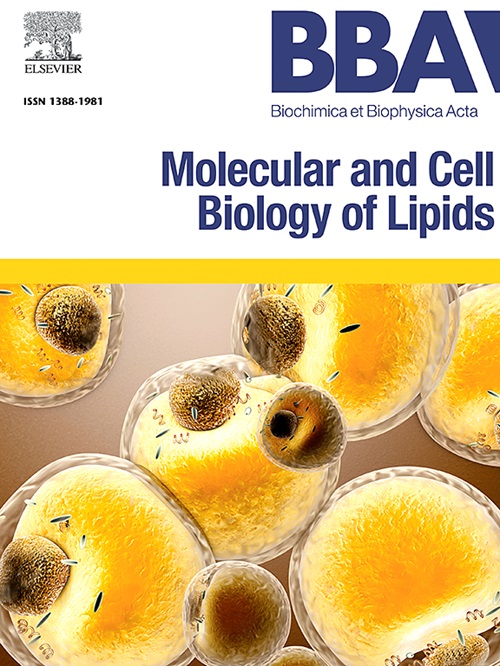DHA suppresses hormone-sensitive and castration-resistant prostate cancer growth by decreasing de novo lipogenesis
IF 3.3
2区 生物学
Q2 BIOCHEMISTRY & MOLECULAR BIOLOGY
Biochimica et biophysica acta. Molecular and cell biology of lipids
Pub Date : 2025-05-16
DOI:10.1016/j.bbalip.2025.159634
引用次数: 0
Abstract
Objective
De novo lipogenesis (DNL) is associated with prostate cancer (PCa) progression, while fatty acid synthase (FASN) overexpression is a hallmark of DNL. Palmitate, its main product, is a saturated fatty acid that supports PCa growth. Polyunsaturated fatty acids (PUFAs), which can be acquired from the microenvironment, undergo peroxidation more readily and affect membrane fluidity. Docosahexaenoic acid (DHA) is a prototype PUFA omega-3 produced inefficiently in human cells. Its levels are low in PCa cells compared to normal cells. We hypothesize that excess DHA may reprogram lipid metabolism and induce cell growth suppression.
Methods
Androgen-responsive LNCaP, castration-resistant cells C4–2 and 22Rv1, human PCa castration-resistant organoids, and prostate cancer xenografts were exposed to DHA.
Results
DHA accumulated into lipid droplets as triacylglycerols and cholesterol esters, led to increased phospholipid acyl chain unsaturation and altered phospholipid ratio, a known trigger of endoplasmic reticulum (ER) stress. DHA caused a decrease in sterol regulatory element-binding protein (SREBP) transcriptional program, which, in turn, led to decreased expression of FASN. The subsequent reduction in DNL caused downregulation of the androgen receptor (AR) and its splice variant AR-V7. In addition, β-oxidation was enhanced, and DHA was preferentially oxidized over palmitate. Glucose oxidation also increased in the presence of DHA. Finally, DHA led to ROS overproduction, oxidative damage, and ER stress.
Conclusions
DHA reduces the growth of hormone-sensitive and castration-resistant PCa both in vitro and in vivo via deregulation of lipid metabolism.

DHA通过减少新生脂肪生成来抑制激素敏感和去势抵抗性前列腺癌的生长。
目的:新生脂肪生成(DNL)与前列腺癌(PCa)进展相关,而脂肪酸合成酶(FASN)过表达是DNL的标志。其主要产品棕榈酸酯是一种支持PCa生长的饱和脂肪酸。多不饱和脂肪酸(PUFAs)可以从微环境中获得,更容易发生过氧化并影响膜的流动性。二十二碳六烯酸(DHA)是人体细胞中低效产生的PUFA -3的原型。与正常细胞相比,它在前列腺癌细胞中的水平较低。我们假设过量的DHA可能会重编程脂质代谢并诱导细胞生长抑制。方法:将雄激素反应性LNCaP、抗去势细胞C4-2和22Rv1、人PCa抗去势类器官和前列腺癌异种移植物暴露于DHA中。结果:DHA以三酰基甘油和胆固醇酯的形式积聚到脂滴中,导致磷脂酰基链不饱和增加和磷脂比率改变,这是内质网应激的已知触发因素。DHA导致甾醇调节元件结合蛋白(SREBP)转录程序减少,进而导致FASN表达减少。随后DNL的减少导致雄激素受体(AR)及其剪接变体AR- v7的下调。此外,β-氧化增强,DHA优先于棕榈酸酯氧化。葡萄糖氧化在DHA的存在下也增加了。最后,DHA导致ROS过量产生、氧化损伤和内质网应激。结论:DHA通过调节脂质代谢,在体内和体外均可降低激素敏感型和去势抵抗型PCa的生长。
本文章由计算机程序翻译,如有差异,请以英文原文为准。
求助全文
约1分钟内获得全文
求助全文
来源期刊
CiteScore
11.00
自引率
2.10%
发文量
109
审稿时长
53 days
期刊介绍:
BBA Molecular and Cell Biology of Lipids publishes papers on original research dealing with novel aspects of molecular genetics related to the lipidome, the biosynthesis of lipids, the role of lipids in cells and whole organisms, the regulation of lipid metabolism and function, and lipidomics in all organisms. Manuscripts should significantly advance the understanding of the molecular mechanisms underlying biological processes in which lipids are involved. Papers detailing novel methodology must report significant biochemical, molecular, or functional insight in the area of lipids.

 求助内容:
求助内容: 应助结果提醒方式:
应助结果提醒方式:


